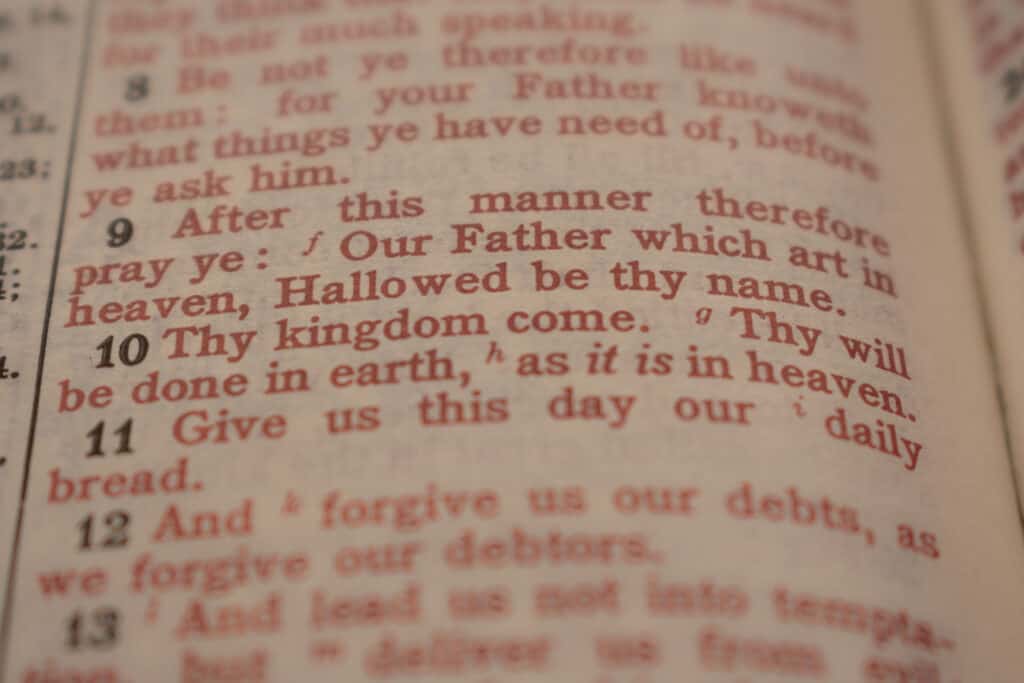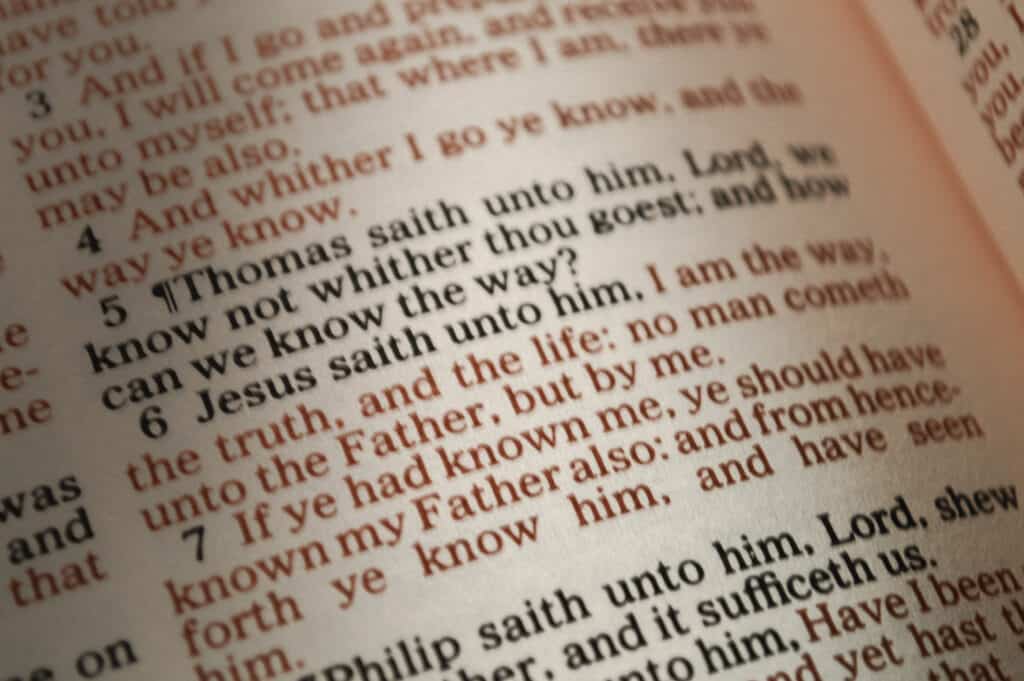As we’ve seen all over the Bible, God wants us to approach Him. He wants a continual, growing relationship with us. And He encourages us to pray directly to Him in the name of His Son, Jesus Christ.

It’s the same when we come to Him broken, ashamed, confused, and needing forgiveness. It happens to us all.
Because of Jesus’ sacrifice on the cross, He is our heavenly mediator. We can approach Him directly through prayer.
He is continually working on our hearts through the Holy Spirit.
Ultimately, our individual forgiveness of sins is a personal matter between each of us and God. It’s true we may need to apologize or make amends with others we might have wronged, but when it comes to our forgiveness from God, no other human being is required to be involved.
But even so, is there a special prayer to pray? Or a certain method or approach we need to use when we ask God for forgiveness? How is this interaction supposed to work?
Let’s find out. We’ll look at:
- How to approach God for forgiveness
- Jesus—the only mediator we need
- What happens when we ask God for forgiveness?
- The transformative benefits of repentance
We’ll start by looking in God’s Word for these answers.
How to approach God for forgiveness
Several Bible verses show God’s desire for us to turn directly to Him when we’re struggling with sin. And some of the most well-known confessions in the Bible involve a person addressing God directly with humility and full honesty:
I acknowledged my sin to You, and I did not cover my iniquity; I said, ‘I will confess my transgressions to the LORD,’ and You forgave the iniquity of my sin
Psalm 32:5, ESV
Then I turned my face to the Lord God, seeking Him by prayer and pleas for mercy with fasting and sackcloth and ashes. I prayed to the LORD my God and made confession, saying, ‘O Lord, the great and awesome God, who keeps covenant and steadfast love with those who love Him and keep His commandments, we have sinned and done wrong and acted wickedly and rebelled, turning aside from Your commandments and rules’
Daniel 9:3–5, ESV
We can also look at some direct instructions from Jesus to His disciples in the part of the Bible we call “The Lord’s Prayer.”
Jesus was teaching the disciples about all the different parts of prayer—which included asking for forgiveness.

Our Father in heaven, hallowed be Your name. Your kingdom come, Your will be done, on earth as it is in heaven. Give us this day our daily bread, and forgive us our debts, as we also have forgiven our debtors. And lead us not into temptation, but deliver us from evil
Matthew 6:9–13, ESV, emphasis added
Due to the times they were living in, Jesus’ disciples needed a simple, straightforward example of the different things to address in prayer to God.
A common example of prayer the disciples likely saw was the method the Pharisees used: loud, self-righteous, and more about speaking their own minds than seeking the mind of God (see Luke 18: 9–14). Not a whole lot of help when it comes to sincerely asking God for forgiveness.
So what does God want us to do? Is that really it? We just…ask?
What if our relationship with God is strained? What if we haven’t prayed in a long time?
The method is the same. It isn’t about our efforts—it’s about God’s grace.
There’s nothing we can do to earn the right to ask God for forgiveness, just like there’s nothing we can do to earn salvation. That’s the beauty of it. And it can be truly humbling.
David expresses this sentiment in Psalm 51:
You do not want a sacrifice, or I would give it; You are not pleased with a burnt offering. The sacrifice pleasing to God is a broken spirit. You will not despise a broken and humbled heart, God
verses 16–17, CSB
And David was confessing some awful things. Murder, adultery, deceit. Yet he knew that the only way to receive forgiveness from God is to go straight to Him and lay everything before Him.
No religious rituals or lists of good deeds could make any difference in our “forgiveability.”
We are saved by grace because we are forgiven by grace, “not from works, so that no one can boast” (Ephesians 2:9, CSB).
Want to learn even more about God’s mercy and unconditional love? Start your own free Bible study.
Jesus—the only mediator we need
So how can this be? How can we, as weak and ordinary people prone to sin, just outright ask the Creator of the universe to forgive our sins? And not just once, but over and over?
There’s only one way such a relationship could be mended. Through a mediator—someone who is one with God, yet has experienced life as we have. And that’s Jesus Christ, the Son of God and our Savior. He is all we need.
Let’s first think about this in human terms. Say someone seriously wronged another person—maybe by manipulating them, stealing from them, belittling them, or any number of awful sins that can destroy trust. This person may indeed become repentant and seek forgiveness from that person. But to be able to approach the one they’ve wronged, having a mediator would make sense to facilitate an equal, honest, fair interaction.
This mediator, by nature of the name, would play for both teams. The individual would keep the one who was wronged safe from any further incident with the wrongdoer during this interaction. And the mediator would make sure that the wrongdoer indeed got to be heard and understood, express remorse, and appropriately make the request for forgiveness.
The mediator makes sure the message is clearly communicated and also works with each person involved to make sure they’re clear on the purpose of the interaction, what is hoped to be accomplished, and what kinds of things would determine if the interaction was successful or not.
The mediator makes these difficult kinds of interactions possible.
Now in that example, of course, we were talking about a human mediator working with two humans. But there are significant similarities, even when we talk about humans (us) reconciling with God through Jesus.
Jesus is God and part of the Trinity—one with God the Father and the Holy Spirit. And, as pointed out by Sam Neves, Associate Director of Communication for the Adventist Church, Jesus is also the best choice to intercede for us because He experienced human life firsthand:
As Hebrews 4:15 explains to us, Jesus went through all the same struggles we do, was tempted in the same ways we are, yet He never sinned. His experience on earth shows that He has a personal understanding of the worries and challenges we face.
Things can also be taken a step further. Aside from living a perfect life among sin-stained humanity, Jesus also demonstrated how much God loves us and wants to redeem us by taking on the ultimate “wages of sin” (Romans 6:23, ESV) and dying on the cross in our place.

This makes Jesus the most fitting mediator of all. He’s the approachable go-between that connects fallen humanity to a perfect God. He is the only one who could ever truly intercede between us and holy perfection. He said so Himself:
I am the way, and the truth, and the life. No one comes to the Father except through Me
John 14:6, ESV

Jesus facilitates the interaction between us and God the Father. He is of the same mind as the Father. And yet He represents us to the fullness of God.
For there is one God and one mediator between God and mankind, the man Christ Jesus
1 Timothy 2:5, CSB
This knowledge can be a great comfort to those of us who worry about confessing our sins to God.
Satan has done a lot of work around the world to make us believe that God either doesn’t exist at all or that He’s just some distant, unfeeling being who rules the universe but has no concept of what our lives are really like.
That simply isn’t the case. God has intimate knowledge of the struggles we humans face each minute. He feels our pain with us.
We never need to feel insecure about bringing our sins and our burdens directly to Him. He knows our hearts and is willing to forgive us simply because we come to Him.
What happens when I ask God for forgiveness?
We’ve seen the importance of turning to God when we sin and how Christ acts as our mediator. But what comes next?
What happens after we come to God with our sins and He forgives us?
We don’t always feel it or realize it right away, but after we seek forgiveness from God, a transformation happens.

We are made completely clean. Our “record” of sins is wiped. Erased.
God takes us back like the good Father He is (see Luke 15:11–32), and we continue on with a stronger relationship with Him. Our mistakes are cast aside. As the Lord said in the book of Isaiah,
Though your sins are like scarlet, they shall be as white as snow; though they are red like crimson, they shall become like wool
Isaiah 1:18, ESV
When we carefully study God’s Word and claim His promises, we learn just how intimately He loves and understands us. He knows the struggles we go through and wants us to come to Him when we fail and fall. That’s how we keep our relationship with Him strong. And when we come to Him, He has the power to wipe away our guilt as if it were never there.
We’ve seen God’s deep desire for us to repent and come back to Him; we’ve understood Christ’s role as the one and only mediator who allows us to go directly to God; and we’ve gone over the straightforward instructions God gives us for how to repent and ask Him for forgiveness.
The process is simple. With God in our lives, the Holy Spirit convicts us of our sins. We come to God with humble hearts, admitting we’ve done wrong, and He forgives us. That’s the way this incredible relationship works between flawed humans and a loving God.
The transformative benefits of repentance
The concepts of repentance and forgiveness go hand in hand. The Bible urges us again and again to come before God with our sins and mistakes so we can be forgiven.
If we confess our sins, He is faithful and just to forgive us our sins and to cleanse us from all unrighteousness
1 John 1:9, ESV
Repent therefore, and turn back, that your sins may be blotted out
Acts 3:19, ESV
Time and again, the Bible urges us to confess our sins to God (Leviticus 26:40) so that He can “take away all iniquity” (Hosea 14:1–2, NKJV).
This is a basic part of our relationship with our Creator. We are flawed people. We will make mistakes. The only way for us to maintain a relationship with a perfect, all-knowing God is to admit our flaws and sins and come before Him for forgiveness.
If we are going to walk with God and keep our thoughts on Him, we need to keep our connection to Him strong. We can’t do that if we are constantly weighed down by the mistakes we’ve made. Repentance is a key component of staying connected to God and remaining perceptive to His presence in our lives.
God wants to free us from guilt and shame and restore us from the inside out.
And Jesus Christ, the Son of God, died on the cross to ensure we have this privilege. Clearly, God wants us to approach Him directly for forgiveness so our relationship with Him can continue to grow closer.
Even if we’re unsure how we’ve sinned, or if we’re having a hard time figuring out if we’re making the best decisions or not, the most fitting thing we can do is set aside some time to pray, reflect, and read His Word. We can say, as Job said:

Teach me, and I will be silent; make me understand how I have gone astray
Job 6:24, ESV
The ultimate goal of repentance isn’t to simply erase a bad mark on a list God keeps for us. Repentance is about maintaining connection, acknowledging the perfect will of God, and allowing Him to restore us.
It’s about experiencing God’s love to the fullest and letting it transform our lives.
Want to connect with God but not sure where to start? Learn all about how to pray and how prayer works with this free online Bible study.